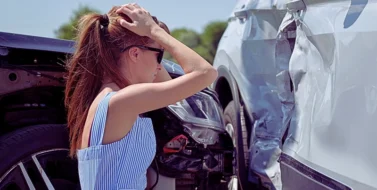Yes, you can sue a drunk driver in Illinois if they caused a car accident that injured you or resulted in your loved one’s death. Illinois law allows victims to pursue damages for medical bills, lost wages, pain and suffering, and even punitive damages when negligence is especially reckless. Knowing your rights early, gathering evidence, and hiring a car accident lawyer to help you with your lawsuit can increase your chances of securing maximum compensation.

If you’re considering suing a drunk driver after an accident in Chicago, call Lloyd Miller Law at 773-838-8100 for a free consultation.
Table of Contents
Why Should You Sue a Drunk Driver After an Accident?
Suing a drunk driver isn’t just about money. It’s also about holding someone accountable for reckless behavior that could have been avoided. Alcohol impairs judgment, slows reaction times, and drastically increases the risk of deadly crashes. When a driver ignores the law and gets behind the wheel intoxicated, the consequences can be catastrophic.
Here’s why filing a lawsuit matters:
Compensation for Damages Beyond Criminal Penalties
While criminal DUI charges might lead to fines, license suspension, or even jail time, those penalties don’t compensate victims for medical bills, lost income, or emotional trauma. A civil lawsuit provides a legal path to recover these tangible and intangible losses.
Punitive Damages to Deter Reckless Behavior
In cases where the driver’s conduct was egregious, such as repeat offenses or extreme intoxication, courts may award punitive damages. This is money intended to punish the wrongdoer and send a clear message: driving drunk is unacceptable and won’t be tolerated.
Justice for Victims and Their Families
Civil suits also offer victims and families a voice when tragedy strikes. Seeking justice in court can bring a sense of closure and public accountability, especially when criminal penalties fall short.
Encouraging Safer Roads Through Accountability
Holding drunk drivers financially responsible helps drive broader change. When offenders face the real consequences of their actions, it reinforces the importance of safe driving behaviors and supports community efforts to reduce impaired driving incidents.
Bottom line: Don’t let a drunk driver off the hook. The civil legal system is designed to help victims recover and send a strong deterrent to dangerous behavior on Illinois roads.
Sobering Stats: How Alcohol Still Impacts Illinois Roads
Despite the rise of ride‑share services and ignition interlock devices, drunk driving remains a deadly threat on Illinois roads. Here are the most recent figures from the Illinois Secretary of State and IDOT crash reports:
- Alcohol‑related crashes claimed 294 lives in 2023, representing 23% of the state’s 1,268 total crash fatalities.
- In total, 1,142 fatal crashes occurred in Illinois in 2023; of these, 22.3% involved alcohol.
- The Secretary of State recorded 21,245 DUI arrests in 2024.
- 90% of eligible drivers arrested for DUI lost their driving privileges, slightly down from the prior 91%.
- 245 drivers under 21 lost their licenses under the Zero‑Tolerance law in 2024.
- Women comprised 25% of DUI offenders (vs. 26% previously) and males aged 25‑34 again had the highest DUI arrest rate (~6 per 1,000 licensed drivers).
- 87% of DUI arrests were first‑time offenders (vs. 86% previously)
What Damages Can You Recover in a Drunk Driving Lawsuit?
When you sue a drunk driver in Illinois, you’re you’re fighting to recover compensation for the real costs and consequences of their reckless behavior. The law allows victims to seek several types of damages, depending on the facts of the case and the severity of injuries.
Economic Damages
These cover measurable financial losses, including:
- Medical expenses: Emergency care, surgeries, hospital stays, rehab, ongoing treatments, medications, and therapy.
- Lost wages: Income lost during recovery, inability to work, or diminished earning capacity.
- Property damage: Repair or replacement costs for your vehicle or other personal property.
- Other out-of-pocket costs: Transportation to medical appointments, home modifications, or assistive devices.
Non-Economic Damages
Not all injuries are visible or easily quantifiable. Non-economic damages address:
- Pain and suffering: Physical pain, emotional distress, and reduced quality of life.
- Loss of consortium: Impact on relationships with spouses or family members.
- Mental anguish: Anxiety, depression, or PTSD stemming from the crash.
Punitive Damages
Illinois law allows punitive damages in drunk driving cases when the defendant’s conduct was especially reckless or intentional. These damages serve to:
- Punish the offender beyond simple compensation.
- Deter future drunk driving by making the financial consequences more severe.
Wrongful Death Damages
If the drunk driving crash resulted in a fatality, family members may recover damages related to:
- Funeral and burial costs.
- Loss of financial support.
- Loss of companionship and guidance.
Proving Liability in a Drunk Driving Accident Lawsuit
In drunk driving car accident lawsuits in Illinois, you must prove the four elements of negligence for your claim to be successful.
- Duty of care: Drivers have a responsibility to comply with traffic regulations, be cautious of hazards, and prioritize the safety of all road users.
- Breach of duty: If drivers engage in dangerous driving practices such as speeding, reckless driving, or driving under the influence, they are breaching the duty of care owed to others.
- Causation: If there is no clear link between the breach and the injuries, there is no cause for legal action.
- Damages: The plaintiff must prove that they suffered damages because of the accident. They must also provide evidence to substantiate the extent of the damages incurred.
A drunk driving accident lawyer will assist in proving the elements to establish the negligence of the drunk driver.
Challenges in Suing a Drunk Driver in Illinois
There may be challenges that you face in claiming compensation from a drunk driver. When considering when to hire a car accident injury lawyer, the sooner, the better, as he or she can help you overcome any possible challenges.
Insurance Coverage Limitations
You may face difficulty in recovering damages due to insurance policy limits. In Illinois, many drivers only purchase the minimum amount of auto insurance, which covers $20,000 for property damage and $25,000 for one person’s personal injuries or death.
If your damages surpass the policy limit, and you need to recover more, you may have the option to take legal action against the driver responsible for the accident. If the insurance company agrees to a settlement after getting hit by a drunk driver to the policy limit, you can accept the amount and then sue the driver personally for the remaining recovery. However, if the driver has little or no assets, you may not be able to recover the damages.
Comparative Negligence Laws
It’s possible that you may have been partially responsible for the accident, even if the other driver was primarily at fault. This is known as comparative negligence.
The other party may prove your negligence also played a role in causing the accident. This can lead to a reduction or elimination of your claim, based on the degree of your negligence. The percentage of your negligence is determined by considering how much it contributed to the accident.
For example, if a judge or jury finds that you were 20% responsible for the accident, and the other driver was 80% responsible, you will only be entitled to 80% of the damages you claimed. So, if your claim was for $100,000, you will only receive $80,000.
In Illinois, if you were more than 50% responsible for the accident, you will not be able to receive any damages.
Counterclaims by the Defendant
A counterclaim is a legal claim that the defendant can file against the plaintiff in a lawsuit. The defendant is the person who is sued, while the plaintiff is the person who filed the original lawsuit. A counterclaim is not a separate lawsuit, and its allegations must usually relate to the subject of the original complaint. In other words, the counterclaim must pertain to the underlying car accident, and not to some other legal dispute. Essentially, a counterclaim is the defendant’s way of claiming he or she is not at fault, but rather the victim.
For instance, the defendant may claim that you were negligent at the time of the accident by texting on your phone while driving, speeding, driving while intoxicated or tired, driving a defective car, jaywalking, or making sudden movements if you are a pedestrian. If the defendant can prove these allegations, and they were the cause of the accident rather than intoxication, you may end up facing liability for the accident.





